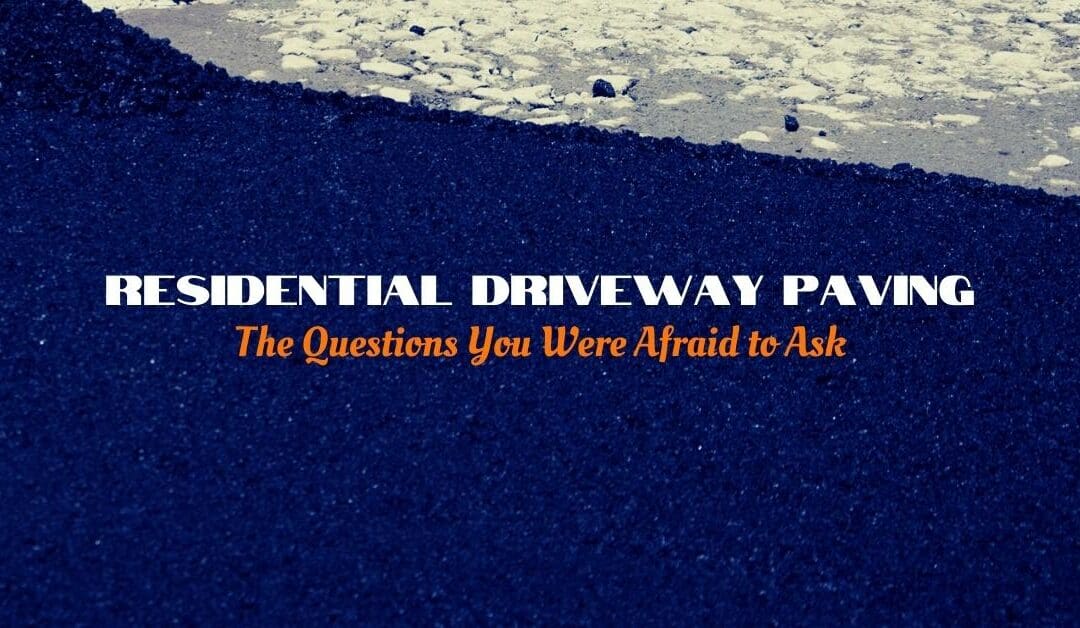If you’re considering paving your home’s driveway, you’re likely to have many questions about the process and what to expect. So, let’s answer some of the most common questions about residential driveway paving. Then you’ll know what to expect and how to get started on this critical project for your home!
Residential Driveway Paving
You’ve been thinking about it for a while now. That dirt driveway isn’t doing your home any favors – in fact, it may even be lowering the value of your property. You know you need to pave it, but you have some questions first.
What kind of driveway should I get?
There are many different types of driveways you can choose from. The most common residential driveway paving materials are concrete, asphalt, and gravel.
Concrete driveways are popular because they are low maintenance and last a long time. However, they are generally more expensive than asphalt and can look dirty very quickly.
Asphalt driveways are also low maintenance and can last 20-25 years. They are less expensive than concrete and never look dirty or worn if you have a seal coat done every couple of years!
According to Family Handyman, “Asphalt pavement is one of the most common materials used for driveways in the U.S. A favorite of homeowners and school builders everywhere, asphalt is affordable and quick to install. It’s a great choice for large areas and creates a smooth, uniform appearance.”
Gravel driveways are the least expensive option, but they require more maintenance and only last about 15 years.
How much will it cost to pave my driveway?
The cost of residential driveway paving depends on the size of your driveway and the type of material you choose. A concrete driveway will be the most expensive, followed by asphalt, with gravel being the least costly option.
For an asphalt driveway, you can estimate the cost by measuring the length and width of your driveway in feet. For every square foot, you can expect to pay between $5 and $7. So, for a basic 20×20 driveway (400 square feet), you would be looking at the cost of between $2000 and $3000.
The national average for a driveway is “$3,000 to $10,000, with most people paying around $5,804 for a 24 by 24-foot hot mix asphalt driveway with a stone base. The low-end costs are as little as $1,214, while high-end projects cost as much as $13,441.” (1)
What is the process of residential asphalt driveway paving?
Asphalt doesn’t have to cure like concrete, so your new driveway is ready sooner!
After the asphalt contractor’s team arrives, their first step is to grade and level your dirt driveway, so it’s ready for paving. Next, they will install the sub-base, followed by the hot mix asphalt.
An excellent asphalt company will have a team of spreaders to ensure the asphalt gets smoothed out before it cools. They will also have the latest equipment to ensure they can compact your driveway to make it level and smooth.
Once compacted, your new driveway will need to cool and set for around 24 hours before you can use it. Unlike concrete which needs to cure for days, asphalt driveways, start to finish, usually only take a couple of days!
How Thick Should an Asphalt Driveway Be?
The average residential asphalt driveway should be around three to four inches thick. This thickness will ensure that your driveway can handle the weight of cars and trucks without cracking or breaking.
It’s important to note that the thicker your asphalt, the more expensive it will be. However, it’s worth the investment as a thicker driveway will last longer and require less maintenance over time.
If you’re not sure how thick your asphalt should be, ask your residential driveway paving contractor for their recommendation based on the size of your driveway and the traffic it will see.
What is a residential driveway paving seal coat?
A seal coat is a thin layer of pavement applied to the surface of your driveway to protect it from weathering, UV rays, and oil and gas spills.
Seal coats consist of coal tar or asphalt emulsion, and they help prolong the life of your driveway by around three to five years.
Applying a seal coat is a relatively simple process and can be done by most residential driveway paving contractors.
Will A New Asphalt Driveway add value to my home?
A residential driveway asphalt paving project will add value to your home!
“According to the National Association of Realtors, a new asphalt driveway can increase the sale price of a home by as much as $15,000. And if you’re planning on selling your home in the next few years, that’s a great return on investment!” (2)
So if you’re considering selling, it’s a no-brainer to spend a few thousand to get a $15,000 result! Not very many investments boast returns like that!
Final Thoughts
If you want to increase the curb appeal and value of your home, residential driveway paving is a great option! With a bit of research, you can find the perfect paving material and contractor to fit your needs and budget. Don’t forget to ask about sealcoating to help prolong the life of your new driveway.
There you have it! All the answers to your residential driveway paving questions! Now that you know what to expect, you can get started on this vital home improvement project.
We hope you feel more prepared and excited to start this project! If you’re looking for a reliable residential asphalt contractor in the area, look no further than us!
We Can Help
At AMP Paving, our hot asphalt mix is ready to lay down for your new driveway! We have residential asphalt paving crews ready to help you increase your home’s value. We’re also here to answer all of your questions. Get in touch with us today for a free quote!

